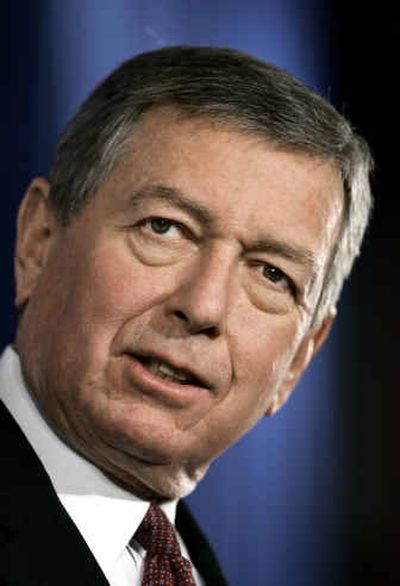Ashcroft defends 9/11 security measures

WASHINGTON – In a farewell interview as attorney general Tuesday, John Ashcroft stood by his hard-edged attacks on critics while adding that he should have done more to reassure the public about the controversial USA Patriot Act, which provided law enforcement with sweeping new police and surveillance powers.
Ashcroft looked back on a contentious four years in office, when he became a lightning rod for the administration’s anti-terrorism policies generally and for the Patriot Act specifically. During the national debate about those measures, Ashcroft sometimes accused critics, including some judges, of hindering national security.
“There’s been so much misunderstanding about what the Patriot Act does, and I wish I’d done a better job explaining it,” Ashcroft said in an interview with about 20 reporters.
The attorney general said the law, which Congress passed six weeks after the Sept. 11 attacks, increased surveillance powers in a sensible way and didn’t curtail civil liberties.
He also said, as he did three months after the attacks, that some critics of administration actions were scaring people with “phantoms of lost liberty” that “only aid the terrorists.”
Ashcroft said his “fundamental responsibility to public safety” required “more effective law enforcement,” and that even some conservatives believed a “false premise” that better policing meant restrictions on freedom.
“We tried to improve law enforcement and expand freedom,” he said.
Ashcroft also said that despite delays and complications in the case of Zacarias Moussaoui, the only defendant who’s been charged so far with participating in the Sept. 11 plot, it was “important to demonstrate we can handle terrorist cases in the criminal justice system,” not just through military detention overseas.
Trial in civilian courts is a necessary option to secure the extradition of some terrorism suspects from other countries, “despite interruptions and delays,” he said.
Ashcroft gave several reasons and theories for why the al Qaeda terrorist organization hasn’t struck on U.S. soil in more than three years.
“The United States is a more hostile environment to terrorists,” he said, but warned that al Qaeda takes a long time to plan and stage attacks.
“We tend to see things as episodic – we fix a problem and put it away,” Ashcroft said, but some terrorists “see themselves in the stream of history, in a battle that began 1,000 years ago.”
He also pointed to improved law enforcement and intelligence gathering.